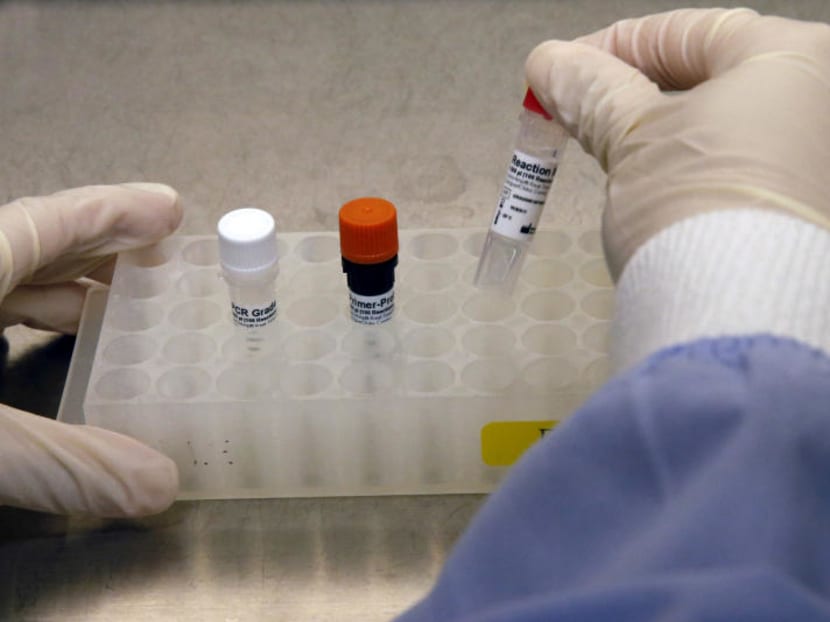S’pore ‘has been preparing to fight Zika for two years’
SINGAPORE — Close to 4,000 blood samples were tested and found negative for Zika between February and August this year, before the first locally-transmitted case of the infection was confirmed, revealed Health Minister Gan Kim Yong as he explained the authorities’ handling of the outbreak.

Research associate Karen Lee of Agency for Science Technology and Research's (A*STAR) Experimental Therapeutics Centre prepares a reaction mix to be tested with the Zika virus diagnostic test kit at their laboratory in Singapore, Feb 10, 2016. Photo: Reuters
SINGAPORE — Close to 4,000 blood samples were tested and found negative for Zika between February and August this year, before the first locally-transmitted case of the infection was confirmed, revealed Health Minister Gan Kim Yong as he explained the authorities’ handling of the outbreak.
Sharing the lessons gleaned from the experience so far, Mr Gan also said that while the number of cases detected in recent days has been tapering off, Singapore cannot afford to be complacent. “It is still early days to ascertain what the long-term trend of Zika infections will be,” Mr Gan said in Parliament on Tuesday (Sept 13), as he called on grassroots leaders, volunteers and residents to continue working together in tackling Zika.
For the first time since Aug 27, no new cases of locally-transmitted Zika were recorded yesterday. The total number of locally-transmitted cases stands at 333.
Amid comments by some medical practitioners and members of the public that MOH should have started investigations or announced confirmed cases earlier, Mr Gan said that the authorities had been preparing for the fight against Zika since two years ago, when a surveillance programme was established.
Authorities worked with 200 clinics islandwide to regularly collect blood samples from patients with symptoms associated with Zika. These efforts were stepped up in January this year, resulting in more than 500 samples tested each month. The authorities had also strengthened laboratory capabilities and kept doctors abreast of developments on Zika.
Such preparation “paid off”, said Mr Gan, referring to how the first imported case was successfully contained due to the surveillance protocol, and no other cases have been subsequently linked to this case.
And when a woman became the first to be confirmed as Zika-positive on August 27, the MOH announced the case “that very evening” along with three cases that were pending confirmation, he said.
The Ministry, which was already investigating reports of an unusual increase in cases of fever, rash, and joint pain at Sims Drive, had began looking back at past cases in the vicinity. The “back-tracing” was why the number of confirmed Zika cases increased from one on Aug 27, to 41 the next day, said Mr Gan.
“This sudden jump was surprising to some people, who wondered if these cases had in fact been detected earlier but held back by MOH,” he said. “In reality, the number of confirmed new Zika-positive patients increased only by five.”
With the outbreak, the authorities have moved beyond the surveillance phase to “actively detect and identify clusters” to manage the spread of Zika. “Even if we can control the present outbreak, we will need to continue to guard against imported cases, as the Zika virus continues to circulate among many countries, including some in the region,” he said.
Responding to his speech as well as that of Minister for the Environment and Water Resources Masagos Zulkifli, MPs asked 20 supplementary questions, six of which involved conditions at construction sites. The first wave of confirmed cases included 36 workers from a Sims Drive construction site.
Non-Constituency Member of Parliament Daniel Goh, for instance, suggested putting in place processes to ensure that construction sites report to MOH whenever they detect large numbers of workers with Zika or dengue symptoms.
Mr Gan stressed that the “key gatekeepers” in tackling infectious diseases are general practitioners. “When they see patterns that are unusual, they will alert MOH and we work together to find out the truth,” he said.






